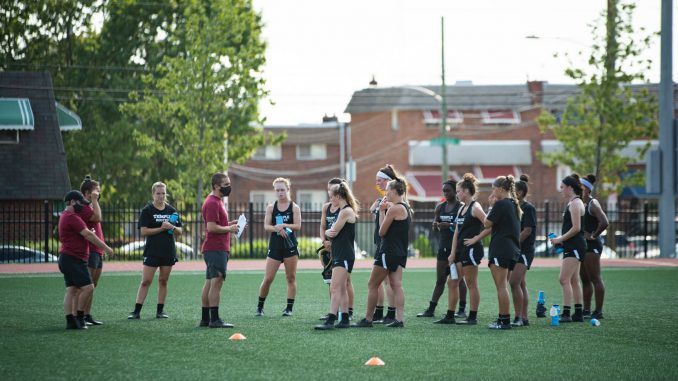
Temple University women’s soccer averaged just 0.89 goals and 0.68 assists a game in their 19 games last year, ranking ninth out of ten in their conference.
Head coach Nick Bochette knows those numbers need to increase dramatically this season, he said.
The Owls finished with an overall record of 5-9-5 last season and had nine games where they scored zero goals.
“The first thing you notice is a lack of goals, then you step back and say, ‘Alright, so what’s being created? Why is there a lack of goals?,’” Bochette said. “When you take that next step, you’ll see there was a lack of creativity and strength in the step before scoring.”
Heading into a season that has been delayed due to COVID-19 concerns, the team plans to focus on areas on the field they can attack to create more scoring opportunities and improve their offense.
Since the season was delayed, Bochette’s team has been able to hone their understanding of schemes, hoping to use the fall as a developmental period, The Temple News reported.
Bochette looks at how often the team makes successful passes into the part of the field closest to the opponent’s goal to gauge how often they create chances to score, he said.
If the field is broken up into a defensive third, a midfield third and an attacking third, Temple entered the attacking third less than half of the time than South Florida did, who was the most efficient attacking team in the American Athletic Conference last year, Bochette said.
The Bulls finished first in the American in shots per game with 17.38 and finished second in the conference in goals per game with 6.19.
“From an attacking standpoint, we really need to develop a system in which we’re successfully delivering balls into the final third and making sure when we do get there,” Bochette said. “It’s not just Gabby [Johnson], it’s not just Hailey [Gutowski] trying to score.”
Gutowski, a junior midfielder, led the team in scoring last year with seven goals, and Johnson, a junior forward, was second with three goals. The rest of the team combined for seven collective goals.
Johnson finished first on the team in shots on goal with 24 while Gutowski finished second with 19. Senior defender Marissa DiGenova finished third recording 12 shots on goal.
The team will still rely on Gutowski, Johnson, and DiGenova to create scoring chances, but there are newcomers who will help to take the pressure off of them, Bochette said.
Transfer junior Emily Kavanaugh is someone willing to work for deflections in front of the net and freshman Lexy Endres can open up opposing defenses with her passing ability, Bochette added. Senior forward Emma Wilkins, who led the team in scoring in 2018, is still rehabbing from a 2019 season-ending injury, but will be fully healthy come spring, Bochette said.
Wilkins played in just nine games last season and recorded two goals and one assist.
“We’ve done a lot of shooting drills, and we’ll usually always end practice with crossing and finishing drills,” Kavanaugh said. “So that really helps to build the connection between all of our forwards and other players as well with just working on finishing services and striking the ball accurately towards goal.”
The Owls are taking practice “slowly” and haven’t even held a full scrimmage yet which means they have not decided the primary formations they will use this season, said senior midfielder Julia Dolan.
“We haven’t really gotten into game plan information because our season obviously got pushed to the spring,” Dolan said. “So right now, we’ve just been working on tactics and the technicals that’ll get us ready for more game-like situations.”
With the season being moved to the spring, the team has more time to implement their new strategies and learn to trust in each other to make fewer mistakes when the season starts, Bochette said.
“They’re learning a new language, a new soccer language that has to be taught,” Bochette said. “For us having a couple months to disseminate new ideas in a new language is really valuable.”


Be the first to comment